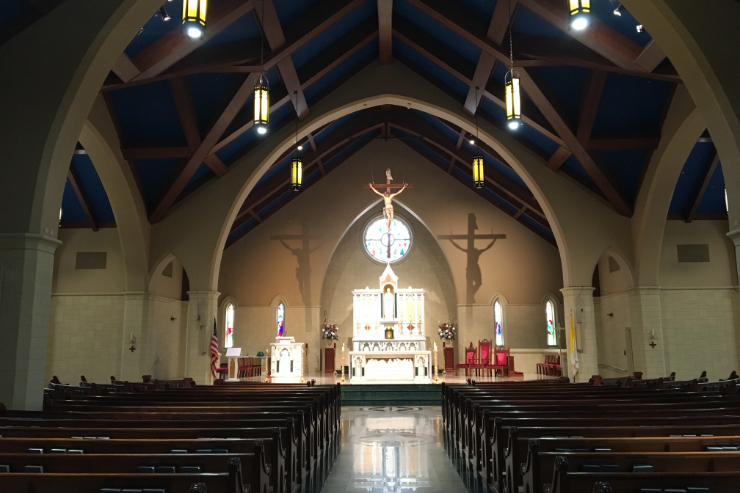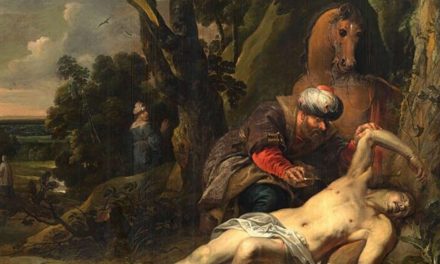
Photograph Copyright © by Deacon Michael Bickerstaff
Today’s Gospel is taken from St. John and continues our short five-week break from Mark’s Gospel that we’ve been hearing during this liturgical year. The focus of the passages during these five weeks is the Eucharist and the Lord’s abundant love for each of us.
So much power and promise are contained in the sixth chapter of John’s gospel, that the Church spends these five weeks of summer, every three years, proclaiming this essential Eucharistic truth of new life in Christ.
Jesus proclaims, “Do not work for food that perishes but for the food that endures for eternal life, which the Son of Man will give you. For on him the Father, God, has set his seal” (John 6:27).
Like the Israelites in today’s first reading from Exodus and those in the gospel passage, we might become distracted by life’s challenges and our own misplaced priorities from what is most important and enduring. We must constantly guard against the influence of the culture around us.
God had taken the Israelites out of Egypt and into the wilderness to form them into a people who would practice and embrace right-worship, right-belief and right-living. They had adapted to and been influenced by the culture in which they lived. They needed to be liberated from both their physical and spiritual bondage at the hands of the Egyptians and from their own sin.
They found themselves in the wilderness, they had no permanent shelter, they were not yet able to begin the routine of everyday life in a settled community. They expressed a desire to return to their former slavery where they argued they would be better off. God responded with care and compassion, giving manna (bread) from heaven and water to drink.
We all face life’s questions—what to eat, what to wear, where to live, what kind of car to drive, what schools for my kids, where to vacation. But, many people face the more serious of life’s difficulties—where to find my next meal, how to find and pay for my child’s medical treatment, stopping the bank from foreclosing on the house or even finding a shelter for my family, having the wrong skills for today’s job market, wherever that might be.
We cannot allow these experiences to mislead us into thinking that we are better off without God, or that we do not have time for God.
In last Sunday’s gospel, Jesus multiplied the loaves and fishes, miraculously feeding the multitude of 5,000 plus who had followed him because of the signs he had performed, healing those who were diseased. In this Sunday’s gospel, people follow Jesus across the sea to Capernaum. Jesus rightly tells them that they have followed him for the wrong reason, not because of his signs, but because of their material desires.
Seeking to provide for our earthly, material needs is not, in itself, wrong. We need to eat earthly food to sustain our bodies. But, this food does not fully satisfy in a way that lasts. We again become hungry and need to eat again. There is much we must do to meet our earthly responsibilities—food, shelter, clothing, medicine, education, etc. Meeting these earthly responsibilities sustains natural life.
The feeding of the five thousand took place at the time of the Passover which celebrates the story of the Exodus of the Israelites from Egypt. This miraculous sign performed by Jesus provided for the material need of the multitude, but it also anticipated the Eucharistic celebration to come.
The true bread from heaven is for our enduring, spiritual need. It is not the ordinary bread we eat to sustain our bodies, but the food that sustains our souls. Jesus Christ is the bread of heaven—his body and blood received in Holy Communion.
Justice demands that we do more than just look afte our material needs. We are to love God above all and our neighbors as ourselves. The food that Jesus gives sustains our supernatural life. He is the true Passover Lamb.
St. Paul reminds us in our reading from Ephesians of this new reality. We who believe and have been baptized have entered a new life. The people of Ephesus lived in a time when the Catholic faith was practiced by a very small fraction of the population. All around them was the distraction of their former way of life. St. Paul forcefully instructs the Church at Ephesus not to live according to their former ways, rather they should put on their new self—that is, put on Christ!
These words of St. Paul are as important to us today as they were to the Ephesians. We live in a time, when the surrounding culture lives according to the ways of the Gentiles, not according to the teachings of Jesus.
The culture defines success differently from how God defines it. Modern culture defines human dignity according to earthly measurements—often based of possessions and power—rather than seeing that human dignity comes from God and is possessed by each human life.
Modern culture’s definition of what is good and bad differs from God’s definition.
St. Paul says that we must choose God’s way. We must turn fully to God and not be distracted or influenced by our former way of life or the culture around us.
The Good News is that Jesus gives us the grace we need to live this new life and be continuously renewed in the inner person. What we cannot accomplish on our own, we can attain in Christ. New life in Christ can help us overcome our disordered desires and sinful nature.
St. Paul refers to the “futility of their minds” speaking of those without Christ. He says that the spirit of our minds can be renewed—made right—in Christ!
Just as the celebration of the Passover was a sign and remembrance of the loving care of our God as he rescued the Israelites from bondage, the Celebration of the Eucharist is a sign and remembrance of the Sacrifice of Christ that redeemed us and led us from the bondage of sin. But, it is even more.
It is the mystical making present of the Sacrifice of the Cross to us in our time and place. It is the mystical joining of our worship of thanksgiving to the Supper of the Lamb in the heavenly liturgy. And it is the real, true and preeminently unique Presence of Christ in the Blessed Sacrament given to us in Holy Communion at the celebration of Holy Mass.
Make us worthy, Lord.
Into the deep…
The scripture readings during Holy Mass for the Eighteenth Sunday in Ordinary Tine (Year B) are Exodus 16:2-4, 12-15; Psalms 78:3-4, 23-24, 25, 54; Ephesians 4:17, 20-24; John 6:24-35.
Deacon Bickerstaff is available to speak at your parish or event. Be sure to check out his Speaker Page to learn more. Into the Deep is a regular feature of the The Integrated Catholic Life™.
Come and Join me on Twitter!














